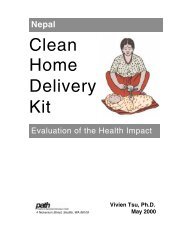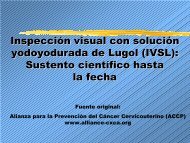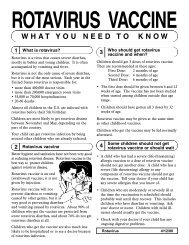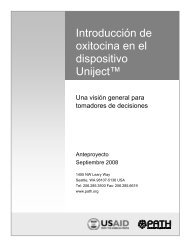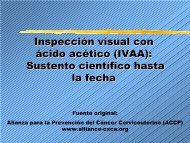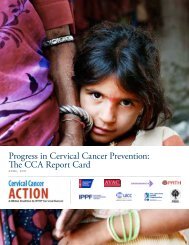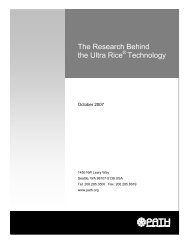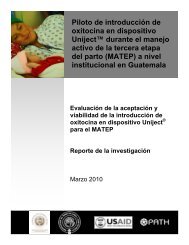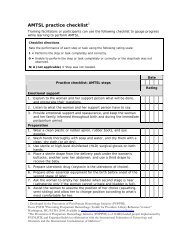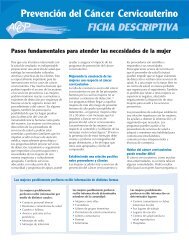Improving Global Health Through Technology Solutions - Path
Improving Global Health Through Technology Solutions - Path
Improving Global Health Through Technology Solutions - Path
Create successful ePaper yourself
Turn your PDF publications into a flip-book with our unique Google optimized e-Paper software.
<strong>Improving</strong> <strong>Global</strong> <strong>Health</strong><br />
<strong>Through</strong> <strong>Technology</strong> <strong>Solutions</strong><br />
UNICEF/HQ020266/Giacomo Pirozzi<br />
In the developing world, the<br />
difference between sickness and health can be as simple as<br />
a sterile needle and syringe, a reliable refrigerator for storing<br />
vaccine, or a basic diagnostic test. Unfortunately, needles<br />
are not easily sterilized or disposed of, refrigerators are<br />
expensive and difficult for rural health workers to maintain,<br />
and laboratories that analyze urine and blood samples for<br />
disease may only exist in major cities, if at all.<br />
PATH has been developing and introducing innovative and<br />
affordable health technologies for 25 years. Our interventions<br />
aim to improve child survival and maternal health in<br />
developing countries.<br />
Working with more than 60 private and 40 public-sector<br />
partners, we have advanced more than 30 economically<br />
sustainable technologies in developing countries, including:<br />
vaccine vial monitors for oral polio,<br />
auto-disable syringes,<br />
Uniject pre-filled injection system, and<br />
point-of-care diagnostic tests for infectious diseases and<br />
nutritional deficiencies.<br />
Currently, our <strong>Technology</strong> <strong>Solutions</strong> Strategic Program is<br />
developing technologies such as:<br />
microbicides—topical substances that may someday be<br />
used to help prevent sexual transmission of HIV;<br />
female barrier contraceptives that enable women to<br />
protect themselves against unwanted pregnancy as well<br />
as sexually transmitted infections, including HIV;<br />
vaccine preservation/stabilization techniques that<br />
eliminate the need for the cold chain;<br />
nevirapine delivery systems, which can help reduce<br />
mother-to-child transmission of HIV;<br />
waste disposal technologies for safely disposing of used<br />
syringes and needles.<br />
J. Fox<br />
J. Fox<br />
Uniject is a trademark of BD.
Our Approach<br />
A User-Driven<br />
Development Process<br />
PATH focuses on advancing solutions that best meet the<br />
needs of end-users. Because users’ concerns and preferences<br />
drive our approach, we involve them in all stages of the<br />
product development pipeline, including:<br />
needs assessment;<br />
product design and development;<br />
field assessment;<br />
technology transfer;<br />
quality assurance;<br />
development of policies, standards, and guidelines; and<br />
local introduction of new technologies.<br />
F. Camus-Bablon<br />
J. Fox<br />
By focusing on users’ needs, PATH’s <strong>Technology</strong> <strong>Solutions</strong><br />
teams develop and introduce the safest, most effective,<br />
and most appropriate interventions for each setting.<br />
In some cases, this may mean working with existing<br />
technologies developed by other groups; in other cases,<br />
it requires developing new technologies. Some PATH<br />
interventions are simple products that can be manufactured<br />
by local companies, while others are highly sophisticated<br />
technologies that must be produced with state-of-the-art<br />
processes and materials.<br />
By tailoring our approach to the needs, challenges, and<br />
resources in each setting, we ensure that we provide the most<br />
appropriate, cost-effective solutions that can achieve the<br />
greatest impact.<br />
C. Nelson<br />
D. Matsyshen<br />
J. Fox<br />
www.path.org
Principles for Adapting and<br />
Developing Technologies<br />
In each of its projects, PATH’s <strong>Technology</strong> <strong>Solutions</strong> program focuses on four core principles:<br />
appropriateness, availability, affordability, and acceptability.<br />
Appropriateness<br />
<strong>Health</strong> equipment and products used in developed countries are often too expensive or too<br />
dependent on labor or other resources to be used in low-resource settings. PATH strives to<br />
develop solutions that are appropriate for the settings we work in. Our focus on user needs<br />
throughout the design, testing, and adaptation of the intervention helps ensure a good fi t. In<br />
addition, we train local staff so they can identify needs and solutions that are best suited to<br />
their conditions.<br />
Availability<br />
PATH ensures that our agreements with manufacturers include terms and conditions that<br />
require adequate supplies for developing-world markets. Another strategy for ensuring the<br />
availability of our products is transferring skills in manufacturing and quality management<br />
to local companies that make health products. PATH also assists government agencies in<br />
developing international procurement capabilities for essential drugs, including contraceptives<br />
and vaccines.<br />
Affordability<br />
Cost can be an insurmountable obstacle in low-resource settings. To minimize the cost of<br />
products and services, PATH works to establish innovative pricing solutions. For example, we<br />
have negotiated license agreements with manufacturers and suppliers to ensure lower costs<br />
for the public sector. Similarly, we help institutions establish cost-effective local capabilities for<br />
purchasing, manufacturing, testing, and distributing effective health products.<br />
Acceptability<br />
If a community perceives a health intervention as dangerous or unnecessary, the intervention<br />
will not be used. PATH’s product-development process ensures that potential users—including<br />
beneficiaries, health care providers, and program managers—contribute to the design of the<br />
intervention, which in turn helps ensure its acceptability. PATH also provides culturally relevant<br />
training, education, and resources that further support the community’s understanding and<br />
acceptance of the intervention.<br />
www.path.org
Ensuring Sustainability for the Future<br />
When transferring a technology to a commercial manufacturer, PATH works to<br />
protect public-sector needs such as product availability, access, and affordability.<br />
Working within PATH’s Guiding Principles for Private Sector Collaboration, we<br />
carefully balance the public sector’s needs with the marketplace requirements of our<br />
commercial collaborators. Our efforts help ensure that the products we develop will be<br />
safe, effective, affordable, and appropriate solutions for users throughout the world.<br />
Partnerships = Success and Impact<br />
With funding from several donors—including the United States Agency for International<br />
Development and the Bill & Melinda Gates Foundation—PATH carries out its work in<br />
partnership with international agencies and private-sector manufacturers. Involving<br />
commercial companies in product development and advancement greatly improves<br />
the chances of developing low-cost, widely available, and self-sustaining products.<br />
About PATH<br />
PATH is an international organization dedicated to developing, implementing, and<br />
evaluating innovative solutions to public health problems. Our mission is to improve health,<br />
especially the health of women and children. We share knowledge, skills, and technologies<br />
with governments and nongovernmental partners in low-resource settings around the<br />
world. Since 1977, PATH has managed more than 1,000 projects in 120 countries, directly<br />
benefiting people, communities, and countries with limited health resources.<br />
For additional information about PATH, please visit our web site at www.path.org.<br />
PATH is a nonprofit, 501(c)(3) organization.<br />
J. Zuckerman<br />
Contact PATH's <strong>Technology</strong> <strong>Solutions</strong> Strategic Program<br />
PATH Phone: 206-285-3500<br />
1455 NW Leary Way Fax: 206-285-6619<br />
Seattle, WA 98107<br />
Email: info@path.org<br />
USA<br />
5/03<br />
Printed on recycled paper



